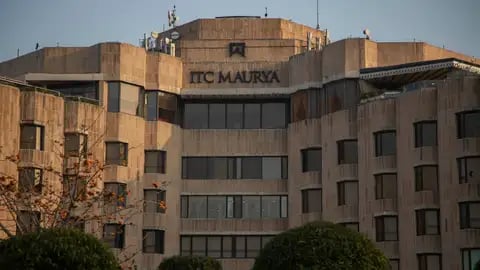Add your promotional text...
ITC's Game-Changing Hotel Demerger: What Investors Need to Know
Synopsis: ITC’s strategic move to demerge its hotel business marks a pivotal moment in the company’s history. This blog dives deep into the demerger's implications, opportunities for investors, and the broader impact on the company's diversified empire. Learn how the demerger opens new avenues for growth, and explore the potential for FMCG and Infotech spins in the future.
TRENDING STOCKS
By Aman Jaiswal
1/7/20254 min read


ITC's Bold New Chapter: Unpacking the Hotel Demerger
In a transformative decision, ITC Limited, one of India’s most renowned conglomerates, has taken a major step toward restructuring its business. As part of a significant corporate overhaul, ITC has announced the demerger of its hotel business into a separate entity—ITC Hotels Limited. This restructuring will not only reshape ITC’s corporate landscape but also offer unique opportunities for investors to tap into a rapidly expanding hospitality sector.
Founded in 1910, ITC has established itself as a powerhouse in various industries, including FMCG, hotels, and agriculture. But despite its diversified portfolio, the company has faced challenges, especially within the hotel business. Historically, ITC’s hotel operations contributed a meager portion of its profits despite heavy investments. This restructuring aims to unlock value for shareholders and streamline ITC’s operations into more profitable ventures.
Understanding the Demerger and Its Implications
The demerger officially came into effect on January 1, 2025, with the record date set for January 6, 2025. This means that ITC shareholders holding shares as of January 3, 2025, will be eligible to receive shares in ITC Hotels Limited, with one ITC Hotels share issued for every ten ITC shares held. Under this arrangement, ITC will retain 40% of the newly-formed hotel company, while the remaining 60% will be distributed among its shareholders.
A Closer Look at ITC’s Business Structure
Before diving into the demerger’s finer details, it's essential to understand ITC's diversified business model. Over the years, ITC has expanded its reach across a wide array of sectors, from FMCG to hotels, agriculture, and paper products. This diversification strategy has allowed the company to maintain a strong market presence while generating consistent profits.
The Journey of ITC Hotels
ITC’s hotel business began in 1975 and has grown to become one of India’s most respected hospitality brands. The company’s hotel portfolio includes 186 properties spread across India and Sri Lanka, with over 188,000 rooms. The hotels cater to various market segments through their different brands, including:
ITC Hotels: A luxury offering with an exclusive tie-up with Marriott’s 'The Luxury Collection.'
Welcomhotels: Premium accommodations for discerning travellers.
Fortune Hotels: Catering to the mid-market and upscale market.
WelcomHeritage: Focused on heritage properties that offer unique experiences.
Comprehensive Strategy Behind the Demerger
To ensure the successful operation of ITC Hotels, the company has allocated a significant cash reserve of Rs 15 billion (bn) to the new entity. The hotel business will also inherit a zero-debt balance sheet, ensuring a clean financial slate for growth. Additionally, ITC Hotels will take over key intellectual properties like the renowned restaurant brands Bukhara, Dum Pukht, and Dakshin.
One notable aspect of this demerger is the listing of "dummy shares" for ITC Hotels, which is a procedural step to prevent any adverse impact on the indices like Sensex and Nifty. These dummy shares will be added to the indices while the actual listing process is set to occur later in January 2025.
Growth Prospects and Market Positioning
The ITC Hotels demerger comes at a critical time for India’s hospitality sector, which is witnessing a significant recovery. With a growing middle class, a surge in business travel, and the government’s push to improve infrastructure, the Indian hotel industry is expected to grow rapidly. ITC Hotels, with its diversified portfolio, is well-positioned to capitalize on this trend.
The company’s focus on capital expenditure, such as renovating existing properties and launching new ones, is indicative of its long-term growth vision. ITC Hotels aims to boost revenue from management contracts to 42% by FY30, transitioning to a more asset-light model that promises higher margins and better returns.
Unlocking Foreign Investment Opportunities
A significant advantage of the demerger is that ITC Hotels will no longer be bound by foreign investment restrictions, unlike its parent company ITC, which has a 34% foreign holding cap. This opens the door for 100% foreign direct investment (FDI) through the automatic route, presenting new opportunities for international investors.
The shareholding structure of ITC Hotels post-demerger will include several major institutional investors, including LIC, SUUTI, and British American Tobacco (BAT). While BAT plans to exit, this shift could create potential challenges and opportunities in the short term.
The Bigger Picture: What’s Next for ITC?
This demerger is just one chapter in ITC’s ongoing evolution. Over the years, ITC has successfully diversified from a single industry player into a multi-sector giant. Despite facing some challenges in its tobacco and hotel businesses, the company has steadily built its dominance in FMCG and other sectors.
Following the demerger of ITC Hotels, speculation is rife about the potential separation of ITC’s FMCG and Infotech segments. While such a move may take several months or even years, it could unlock substantial value for shareholders. Much like other Indian conglomerates that have successfully unlocked value through demergers (such as L&T), ITC’s future looks promising.
A Strategic Move with Long-Term Potential
The demerger of ITC Hotels is a bold and strategic move that holds significant potential for investors. By unlocking value in the hospitality segment and streamlining operations, ITC is setting the stage for more focused growth across its diversified portfolio. However, investors should keep an eye on the post-demerger developments and evaluate the company’s future moves carefully.
As ITC continues to evolve, the opportunity for substantial returns could be within reach, especially for those looking to invest in a dynamic and evolving company with a strong foundation for future growth. Keep an eye on the market, as ITC’s restructuring could just be the beginning of an exciting new chapter.
